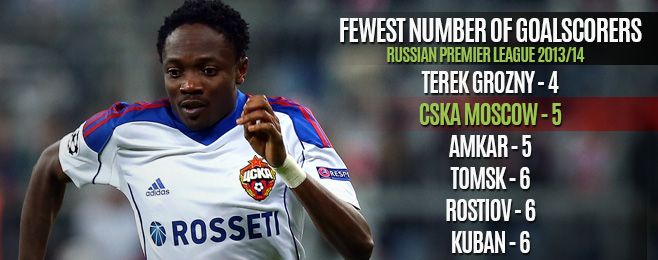
Team Focus: CSKA Failings Down to Lack of Firepower

It’s an old adage in football that retaining a league title is even more difficult than winning it the first time round. Whether such a notion holds true is frankly up for debate, however you can look towards CSKA Moscow as a team who appear intent on adding fuel to the proverbial fire. The Russian champions managed to overthrow Zenit St Petersburg’s recent domestic stronghold last season, however there are real concerns growing around a team that is woefully underperforming.
CSKA’s title success last term was indicative of a side that was able to capitalise upon the discontent within the ranks of their closest rivals. Zenit’s lack of unity following the signings of Hulk and Axel Witsel last summer, sparked by Igor Denisov’s vocal protests against the new arrivals, severely disrupted their hopes of retaining the league title for a third successive season. However, to say that a team can solely win a league title on the back of the misfortune of others is to do a disservice to the eventual victors. CSKA’s team last year, even in the absence of the prolific Seydou Doumbia, was a well-oiled machine – one that produced results with a mechanical authority that few could come close to matching.
This season, however, CSKA have found themselves at an early crossroads where Leonid Slutsky’s side will be forced to sink or swim if they are to stand a chance of maintaining their pursuit of honours and Champions League football next season. Real concerns are mounting regarding the side’s attacking threat, or lack thereof. Where last season Seydou Doumbia’s injury woes were adequately masked by the growth of Ahmed Musa’s development, this term has seen a distinct lack of individuals stepping up to take the burden of goal scoring from the young Nigerian forward.
To have scored a meagre 12 goals in as many games is comparable with the Premier League’s bottom club, Anzhi Makhachkala, and stands as the league’s 4th worst offensive record. When weighed up against the 30 goals that Zenit have scored over the same time frame, the ineptitude of CSKA’s attacking performances truly begins to come to the fore.
The problem that CSKA face is that there’s a lack of penetration within the attacking third. The creative spark that’s provided by the likes of Keisuke Honda and Alan Dzagoev, who has admittedly been injured over recent weeks, has been ineffectual in creating sufficient opportunities through which Ahmed Musa can flourish. This is stressed by the fact that 56% of the team’s shots on goal have been attempted from outside the box – more than any other side in the league. The team are struggling to create clear-cut opportunities and in the absence ofSeydou Doumbia – who is one of the most clinical penalty box finishers in Europe – there’s a concern that the few chances that are being created are not being converted.

Yet another worrying fact is that only 58% of CSKA’s league goals this season have come from open play, which equates to a meagre 7 goals – with the remaining coming from set plays and penalties. The league leaders, Zenit, have four times as many goals from open play at a percentage of 80%, which is an obvious reason as to why Luciano Spalletti’s side are currently some 8 points clear of CSKA, with the gap only ever looking like increasing.
Should CSKA manage to stage a revival then it is imperative that the goals are spread more evenly across the squad. Only five players have managed to get on the score sheet this season, including Vagner Love who has since departed for China, which is a worrying statistic for a side who possess a number of midfield players capable of chipping in with goals – particularly the aforementioned Honda and Dzagoev, as well as the likes of Steven Zuber, Zoran Tosic and Vitinho. When you compare the spread of goals across the remaining top four sides, Zenit and Spartak Moscow have witnessed some 10 different domestic goal scorers, while Lokomotiv Moscow can boast to having had 12.
The departure of Vagner Love is a move that could easily be overlooked when considering just where CSKA Moscow have fallen short so far this season. The Brazilian may have been a colourful, and at times controversial, character however he is an individual who possessed great talent and experience – which are attributes greatly missing at this point. His return to Moscow in the winter of 2012 provided an added impetus to CSKA’s attacking line up and hauled the team across the finish line when there had been signs of a stutter. Had Love continued to ply his trade in Europe – and had CSKA not banked the reported €12m transfer fee – then we may well have witnessed a more dominant CSKA outfit this season.
Ultimately, the period leading up to the lengthy winter break will be a significant test of Leonid Slutsky’s ability to draw every last chunk of effort from his squad. There have been many questions asked of the CSKA coach’s leadership during his time in charge of the club, and despite last season’s title victory dampening the voices of his critics, the team’s recent woes have only served to ensure that their words once again reverberate across Moscow. CSKA will never be as flamboyant as a Zenit side possessing the likes of Danny and Hulk, or as swashbuckling as Spartak Moscow, but they need to regain their poise and authority before the situation becomes impossible to rectify.